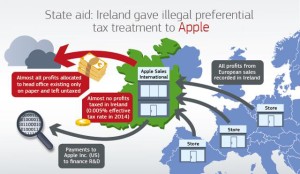1 June 2016 – The European Commission is expected to issue its decision on the Apple/Ireland state aid case … a negative decision is expected … so a short primer on Apple’s EU tax structure:
Apple’s tax structure in Europe
Apple Sales International and Apple Operations Europe are two Irish incorporated companies that are fully-owned by the Apple group, ultimately controlled by the US parent, Apple Inc. They hold the rights to use Apple’s intellectual property to sell and manufacture Apple products outside North and South America under a so-called ‘cost-sharing agreement’ with Apple Inc. Under this agreement, Apple Sales International and Apple Operations Europe make yearly payments to Apple in the US to fund research and development efforts conducted on behalf of the Irish companies in the US. These payments amounted to about US$ 2 billion in 2011 and significantly increased in 2014. These expenses, mainly borne by Apple Sales International, contributed to fund more than half of all research efforts by the Apple group in the US to develop its intellectual property worldwide. These expenses are deducted from the profits recorded by Apple Sales International and Apple Operations Europe in Ireland each year, in line with applicable rules.
The taxable profits of Apple Sales International and Apple Operations Europe in Ireland are determined by a tax ruling granted by Ireland in 1991, which in 2007 was replaced by a similar second tax ruling. This tax ruling was terminated when Apple Sales International and Apple Operations Europe changed their structures in 2015.
Apple Sales International
Apple Sales International is responsible for buying Apple products from equipment manufacturers around the world and selling these products in Europe (as well as in the Middle East, Africa and India). Apple set up their sales operations in Europe in such a way that customers were contractually buying products from Apple Sales International in Ireland rather than from the shops that physically sold the products to customers. In this way Apple recorded all sales, and the profits stemming from these sales, directly in Ireland.
The two tax rulings issued by Ireland concerned the internal allocation of these profits within Apple Sales International (rather than the wider set-up of Apple’s sales operations in Europe). Specifically, they endorsed a split of the profits for tax purposes in Ireland: Under the agreed method, most profits were internally allocated away from Ireland to a ‘head office’ within Apple Sales International. This ‘head office’ was not based in any country and did not have any employees or own premises. Its activities consisted solely of occasional board meetings. Only a fraction of the profits of Apple Sales International were allocated to its Irish branch and subject to tax in Ireland. The remaining vast majority of profits were allocated to the ‘head office’, where they remained untaxed.
Therefore, only a small percentage of Apple Sales International’s profits were taxed in Ireland, and the rest was taxed nowhere. In 2011, for example (according to figures released at US Senate public hearings), Apple Sales International recorded profits of US$ 22 billion (c.a. €16 billion, based on historical exchange rates) but under the terms of the tax ruling only around €50 million were considered taxable in Ireland, leaving €15.95 billion of profits untaxed. As a result, Apple Sales International paid less than €10 million of corporate tax in Ireland in 2011 – an effective tax rate of about 0.05% on its overall annual profits. In subsequent years, Apple Sales International’s recorded profits continued to increase but the profits considered taxable in Ireland under the terms of the tax ruling did not. Thus this effective tax rate decreased further to only 0.005% in 2014.
Apple Operations Europe
On the basis of the same two tax rulings from 1991 and 2007, Apple Operations Europe benefitted from a similar tax arrangement over the same period of time. The company was responsible for manufacturing certain lines of computers for the Apple group. The majority of the profits of this company were also allocated internally to its ‘head office’ and not taxed anywhere.
